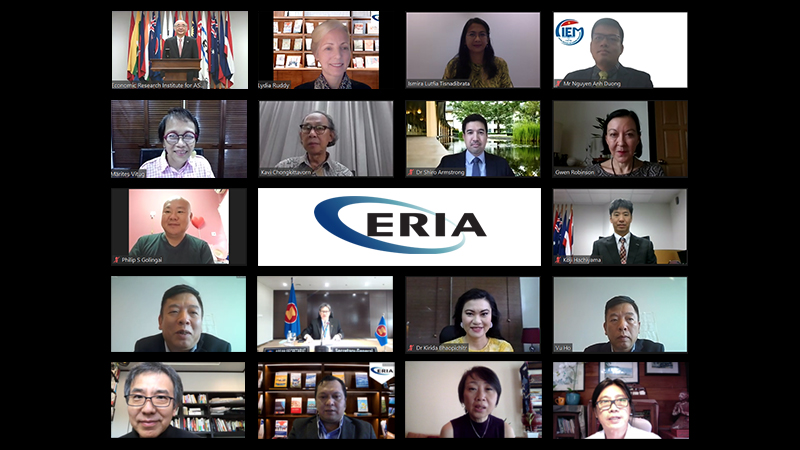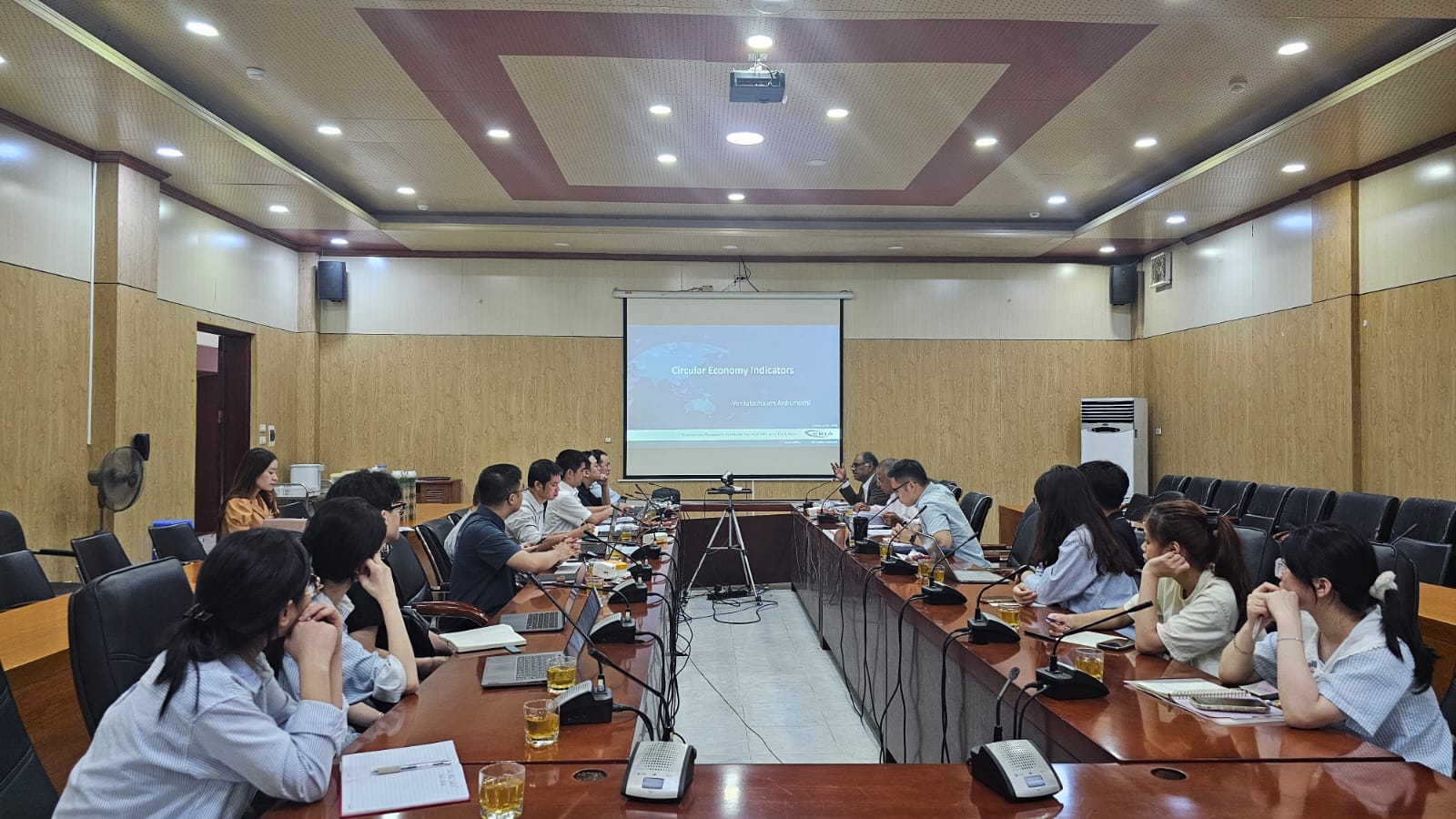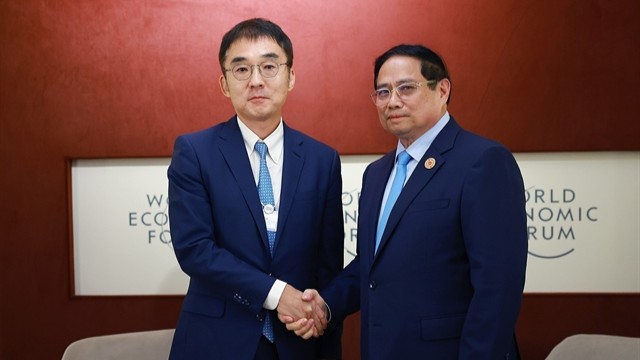ERIA Hosts the 9th ERIA Editors’ Roundtable Online
Date:
5 November 2020Category:
NewsTopics:
ERIA Editors' RoundtableShare Article:
Print Article:
Jakarta, 5 November 2020: For the first time, ERIA hosted its annual Editors Roundtable (ERT) online and it was, therefore, open to many more attendees than usual. In addition, the ERT did not follow Chatham House Rules, allowing journalists to report on comments and information presented during the event.
The first session opened with Prof Hidetoshi Nishimura, President of ERIA, offering welcome remarks. He said, next week ASEAN would be launching the ASEAN Comprehensive Recovery Framework and Implementation Plan. ‘This recovery plan is very important and each of you should follow it closely. I must stress that ASEAN and the Dialogue Partners are working closely and diligently together to mitigate the virus and pave the way for a better future in the post-COVID-19 world', as he stated.
Mr Vu Ho, Director General of ASEAN Department, Ministry of Foreign Affairs of Vietnam, delivered the Keynote Speech, outlining key deliverables of Vietnam’s Chairmanship. ASEAN activities included the Leaders Statement on COVID-19 in February. For the first time ever, ASEAN hosted three summits due to the extra summit hosted to address issues related to the pandemic. The leaders have agreed to five initiatives to address COVID-19: (1) COVID-19 ASEAN Response Fund proposed by Vietnam and Thailand which has already reached $10 million (2) Regional Reserve of Medical Supplies (3) Regional Standard Operating Procedures to cope with future pandemics (4) ASEAN Comprehensive Recovery Framework and Implementation Plan which will be announced in the ASEAN Summit later in November (5) ASEAN Center for Public Health with funding from Japan. He also mentioned efforts to create ASEAN travel corridors. Regarding the ASEAN Community Building processes, the Midterm Review is being completed. There is also a plan to start discussing ASEAN Beyond 2025. RCEP negotiation is 90% done. The development of sub-regional frameworks need to be synergized with the ASEAN Community Building process. ‘With the help from ERIA and all of you here, we will learn lessons about how to cope with COVID-19', said Mr Vu Ho.
The first panel titled ‘How can ASEAN overcome the negative impacts of Covid-19?‘ was moderated by Ms Gwen Robinson, Editor at Large, Nikkei Asia. Panelists included:
- Dr Kirida Bhaopichitr, Research Director of Thailand Development Research Institution Foundation
- Dr Shiro Armstrong, Director, Australia-Japan Research Centre, Australian National University, Canberra, Australia
- Dr Nguyen Anh Duong, Economist, Vietnam
- Dr Dionisius Narjoko, Senior Economist, ERIA
After Ms Robinson introduced the panelists, Dr Armstrong launched the session by stating that ASEAN coherence and political leadership is increasingly important given the breakdown in international cooperation. Cooperation is key – within ASEAN, as well as mobilizing support from outside ASEAN. How ASEAN can drive global cooperation – ASEAN can help avoid the breakdown of international institutions and collaboration, at least in this part of the world. RCEP is a huge positive step in that direction
Dr Kirida spoke about the economic side of dealing with COVID-19. How do we support livelihoods and prepare people for the world post-COVID-19? Containing the pandemic is important but that does not mean striving for a zero-infection rate which has a very heavy impact on the economy. The question becomes how to stimulate domestic demand within each ASEAN Member State (AMS), especially in groups that still have purchasing power. Governments also play an important role – through tax incentives, direct spending, support to SMEs etc… Governments will also need to determine the best way to open their countries by allowing people in.
Dr Narjoko shared Indonesia’s experience in managing the pandemic. Initially, the government struggled because the health systems were not prepared. But ASEAN and Dialogue Partners provided assistance and the management of the pandemic itself improved. However, then the problem becomes stabilizing the economy and the focus shifted to maintaining social support and reviving demand. From the regional perspective, cooperation is very important, especially as related to GDP contraction, to ensure that the difference between countries is not too vast. Connectivity is also important because production in this region is driven by global value chains. Lastly, open trade regimes and air transport must be maintained and the tourism sector must be revived.
Mr Nguyen stated that the key challenge is how to revive confidence in deeper economic integration. Concrete actions are needed, but it is challenging as each country is dealing with its specific issues. But we need integration to support regional supply chains. And we should not compete with each other regarding FDI. Apart from macro and fiscal stimulus to support MSMEs – there are actions the government can take, for instance reducing unnecessary regulatory burdens.
During the QnA session, several additional themes emerged: protectionism, trade agreements, communication leaders, tourism, and investment.
Panel two was titled ‘The Role of Media in Addressing COVID-19’ and was moderated by Mr Yasu Ota, Editorial Writer, Columnist, Nikkei.
Mr Ota began with the statement that the role of the media is clear: to disseminate information accurately and responsibly. But the question is how to do that. The panelists were:
- Aung Zaw, Editor-in-Chief of The Irrawaddy, Myanmar
- Johanna Son, Editor and Founder of Reporting ASEAN, Thailand
- Marites Vitug, Editor at Large Rappler, Philippines
- Philip S Golingai, Online Editor, The Star, Malaysia
- Ismira Lutfia, Independent Journalist, Indonesia
Ms Son discussed the different waves of COVID-19 in Thailand and how the issues have changed. Questions now are turning to the role of ASEAN and regionalism. Journalists have had to quickly understand brand new issues like epidemiology and health. In addition, maintaining independence has become a real challenge as data and information is from the government. Lastly, there is COVID-19 fatigue - ‘so the question becomes how to continue to tell the story. It is much more than a health story', she said.
Mr Zaw spoke about the confluence of the election in Myanmar and COVID-19. Cases were initially low in Myanmar, so people were not too worried. But fake news has become the biggest challenge. The government has cracked down on journalists as a result. COVID -19 is rising quickly in certain populations, especially migrant workers along the Thai border and due to the conflict along the border with Bangladesh. As offices re-opened in June, cases started to soar. Journalists have to learn a lot of new skills and fact check for fake news.
Mr Golingai spoke about news fatigue, which he said was largely due to the sad stories. He said, ‘but people are interested in the human-interest stories that are inspiring.’ And people are still interested in the number of cases. Media also plays the role of voice for the people. We can pose the questions to the officials. Malaysia is also a victim of fake news.
Picking up on the issue of numbers – Mr Ota described similar circumstances in Japan where journalists have been ‘chasing numbers’ to compare one city to another. ‘Tokyo is better than Osaka. Osaka is better than Hokkaido. Numbers are important but at the same time, we need to do a better job explaining what the numbers mean', as he mentioned.
Ms Vitug spoke about the limitations of virtual briefings - it is very difficult to ask questions and get complete information. But overall there is good reportage on explaining data. Academics have been very helpful in explaining the issues. There is an issue of press freedom in the Philippines – at the height of the pandemic, the government shut down the largest tv network. In this regard, the pandemic has been limited in terms of audience reach. Lastly, fake news is common so they conduct daily fact-checking.
Pandemic fatigue is a real problem, said Ms Lutfia. Also, the amount of information is daunting. ‘Our job is to put information in perspective. We suddenly all become health journalists. In the early stages of the pandemic, we were only able to access the information that was given to us by the government – we were not allowed to go out to report from the field to get a different perspective', as she said.
‘We have to have the stories as well as the numbers’ said Mr Ota. He also described how COVID-19 can become the source of division as communities become xenophobic and shun outsiders and then asked Ms Lutfia what is the right way to report, without agitating, in such a diverse place like Indonesia. She replied that in addition to issues regarding whether the vaccine is halal, there is the challenge of who will have access to the vaccine first. Officials give different updates on the availability of the vaccine.
Other issues that covered during QnA – whether people will cooperate to overcome the virus, trust in government, and COVID-19 as a uniter or divider. Also, how far should journalists go in terms of exposing themselves to the risk of contracting COVID-19? The amount of data is also a huge challenge. How should information be communicated – images or written?
The last session, and highlight of the day – the Special Dialogue with Secretary-General HE Dato Paduka Lim Jock Hoi. Prof Nishimura posed the questions on behalf of all participants.
Q: Can you please tell us more about the ASEAN Comprehensive Recovery Framework?
A: The Framework serves as a consolidated exit strategy from COVID-19. It is also a whole of community strategy, not just for health, but also for economic recovery and the re-opening of the economy. People are at the core, especially the most vulnerable. It covers five areas:
- Enhancing health systems
- Strengthen human security
- Maximize intra-ASEAN trade and broaden economic integration
- Inclusive digital transformation
- A more resilient and sustainable future
Not only a framework but also an implementation plan with concrete actions. ‘This is a very important plan and we hope the leaders will endorse it', HE Dato Paduka Lim Jock Hoi added.
Q: What is your assessment of the ASEAN strategy to balance health and economic measures?
A: ASEAN was very quick to implement measures to contain the pandemic. Saving lives is of paramount importance. Vulnerable populations and SMEs have received support. AMS has focused on financial health and liquidity, monetary policy, and other stimuli to the tune of 400 billion. Safeguarding people and at the same time regional coordination, coordinated response, safe re-opening for each country. At the same time, people must be protected and jobs and income must be sustained. We are working on ASEAN Travel Corridors – especially for essential travelers.
Q: How can ASEAN Build Back Better in post-COVID-19?
A: The pandemic has unveiled our short-comings. At the same time, it provides an opportunity to build back better. First, we need to address the vulnerabilities that were exposed during the pandemic by increasing social protections. Second, we will embrace digital transformation which will drive future economic growth, but we need to address the digital divide to make sure no one is left behind. The transformation will require infrastructure, hard and soft, as well as skills and training for vulnerable communities. Third, recovery must be sustainable. All actions must address climate change and resilience
Q: What is ASEAN doing to ensure the availability of safe vaccines?
A: ‘No-one is safe until everyone is safe', stated HE Dato Paduka Lim Jockhoi. We have created the COVID 19 Response Fund. It can supply vaccines and other medical supplies. We hope Dialogue Partners, as well as AMS, are interested in investing in the Fund. We also need to improve the quality of our healthcare. The Center for Public Health Emergencies will be announced soon.
Q: Do you have any suggestions to strengthen intra-ASEAN supply chains?
A: Our Economic leaders have reiterated the need to keep markets open, for instance, with the Hanoi Declaration. Also, AMS needs to ensure that the flow of goods is maintained in accordance with WHO and ATIGA. Under the Hanoi Action Plan, we are developing an MOU to limit NTMs on essential goods. ASEAN should focus on digital technology to ensure resilient supply chains through measures like single windows and electronic documentation. The ASEAN Custom Transit System is now live. RCEP will hopefully be signed by the end of this summit which will give an important signal to the world that we remain open to multi-lateral trade.
Q: What needs to be done to bridge the digital gap between ASEAN Members?
A: in our regional framework, we need to ensure that no one is left behind. Digital transformation is accelerating at a phenomenal pace during the pandemic. First, we will enhance digital connectivity by increasing broadband affordability and coverage and ICT usage, especially in remote regions. We also need to lower international roaming charges to boost productivity. Second, we will promote accessibility services to empower people and businesses to achieve communal and social goals. This includes developing literacy and skills. Third, we will provide digital platforms for eCommerce for MSMEs. To do this effectively, issues with cybersecurity must be addressed. We will also expand the eCommerce agreement which will come into force very soon.
After the completion of the Dialogue with the Secretary-General, Mr Koji Hachiyama, COO of ERIA, closed the roundtable by thanking all the participants. He hoped that next year we could meet in person.








